European elections 2019: A moment of truth for nationalists
- Published
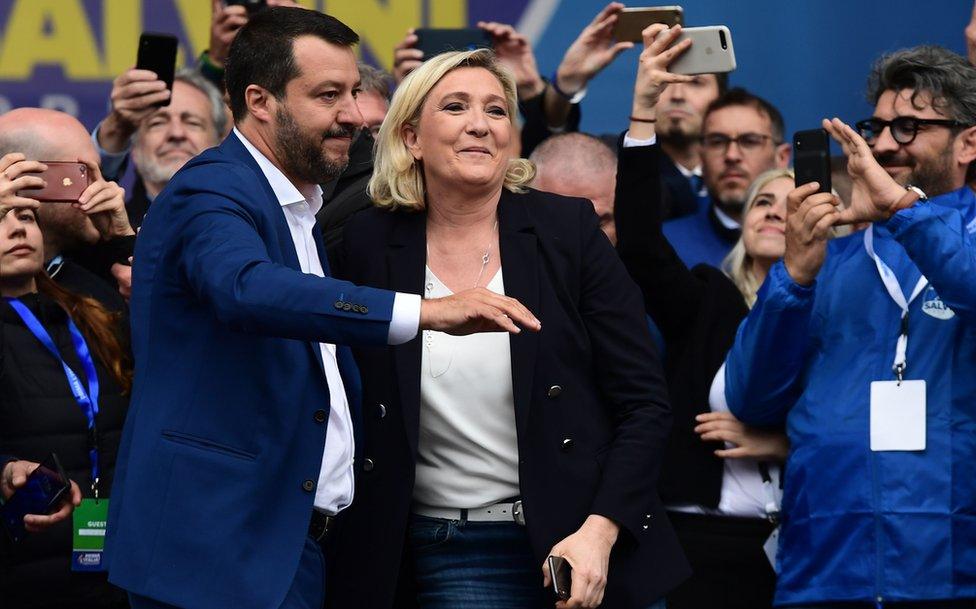
Marine Le Pen was one of 11 leaders from Europe's populist far right who joined Matteo Salvini for a rally in Milan on 18 May
The populist far right are looking to this week's EU parliamentary elections to kick-start a pan-European nationalist alliance.
For years, they have tried to form a cohesive group, and now they have a figurehead in Italy's most powerful politician - Deputy Prime Minister and Interior Minister Matteo Salvini, previously the leader of a half-forgotten regional party.
But the challenges are clear. Days before the vote, one of the very few far-right parties in power in Europe was forced out of government in Austria amid a secret video scandal.
BBC correspondents report on the would-be alliance from around Europe.

Salvini issues Europe rallying cry
By James Reynolds, BBC News, Turin
Matteo Salvini does not like to be interrupted. A few minutes into his campaign rally in this northern Italian town, a small group of hecklers caught his attention.
He raised his finger. "If you touch any of the good people in the crowd," Matteo Salvini shouted at the hecklers, "I will get angry like a beast. OK? OK?"
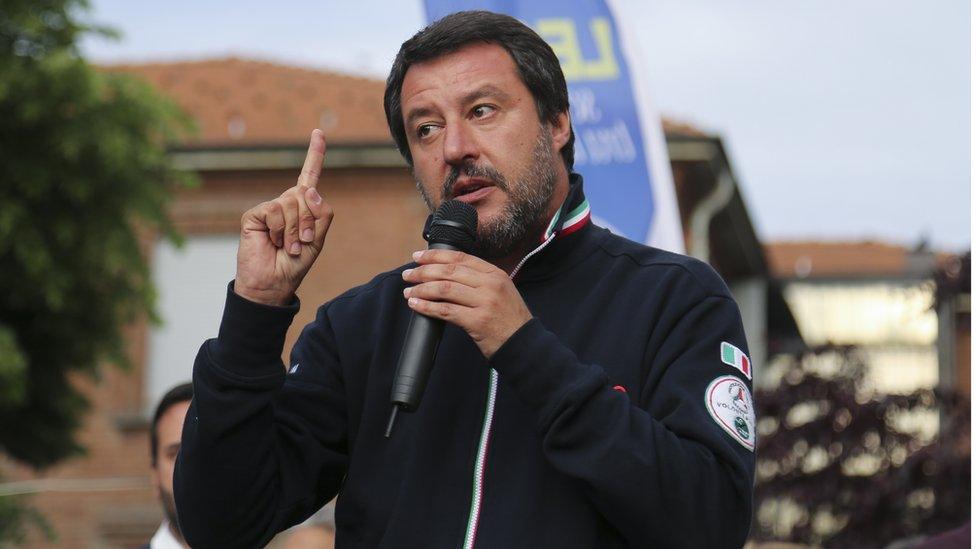
Mr Salvini has travelled across Europe in an attempt to drum up support for a nationalist alliance
"Salvini is the future of Europe," one woman told me.
Italy's League party leader aims to bring together Europe's disparate far right into a cohesive movement.
The far-right, populist movements are united by their condemnation of EU bureaucracy, migration, and Islam. They aim to take enough seats in the EU parliamentary election to be able to disrupt the institution from within.
Their election campaign culminated in Milan on 18 May, when far-right, populist politicians from 11 EU countries joined Mr Salvini at a rally. Anti-fascist campaigners in Milan held their own counter-protests, and called on the populists to leave.
It would have been 12 countries, but Austrian Vice-Chancellor Heinz-Christian Strache could not attend as he was caught up in the secret video scandal and had to resign.
If they do succeed in winning more seats in the European Parliament, they may also end up revealing the divisions within their ad hoc alliance - particularly over economic policy.

Will scandal jeopardise far-right push?
By Bethany Bell, BBC News, Vienna
The Freedom Party is arguably Europe's most well-established far-right movement, but has become embroiled in a full-blown corruption scandal.
With its anti-immigrant, anti-Muslim messages, the FPÖ has been a source of inspiration for many of Europe's populist parties, notably Germany's main opposition AfD, the Finns Party and the Danish People's Party.
In a matter of days, it has gone from influential coalition partner to national disgrace, its leader caught in a video sting apparently promising public contracts in return for political and financial support to a woman posing as a Russian oligarch's niece.
The scandal could hit the party at the polls.
Leader Heinz-Christian Strache has enjoyed cordial relations with Matteo Salvini and signed up to his European alliance, taking part before the scandal broke in a series of what appear to have been carefully choreographed meetings.
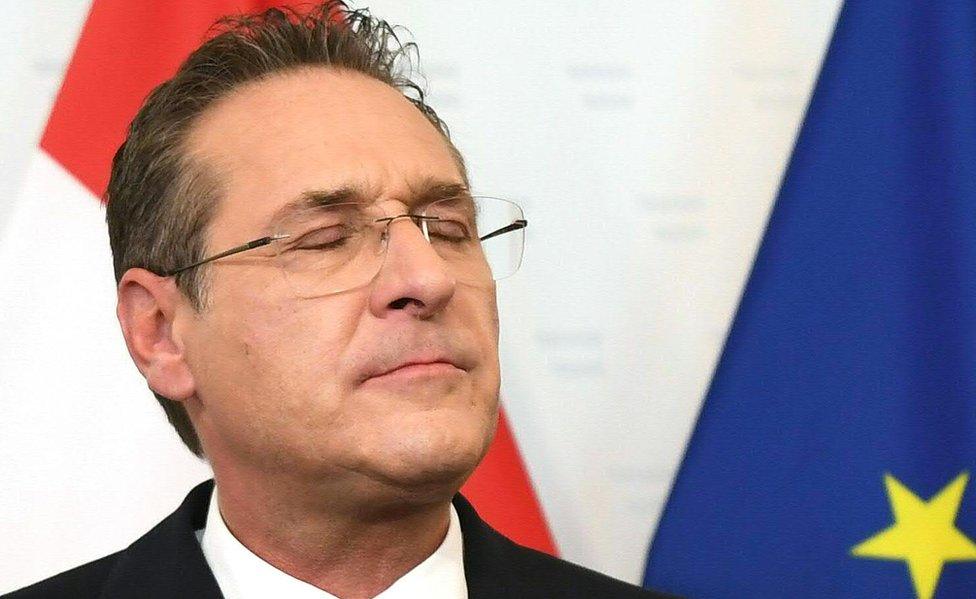
Mr Strache resigned hours after the video emerged of him and a party colleague caught in a sting in the Spanish resort island of Ibiza
But analysts believe they have competing nationalisms. They have clashed over Freedom Party proposals to give dual citizenship to the German-speaking minority in South Tyrol in northern Italy.
In the same way, parties in the far-right alliance may agree on what they oppose in Europe, but they may find it harder to agree on a common course of action.
Northern and southern parties have very different views on the EU's budget.
Mr Salvini, Mr Strache and French far-right leader Marine Le Pen are interested in closer relations with Russia, but that goes down very badly with parties in Eastern Europe, notably Poland.

Will France's Le Pen fit in Salvini's plan?
By Lucy Williamson, BBC News, Paris
There's been a certain stiffness in the air around Marine Le Pen's new political courtship. Perhaps it's not surprising; company is not something her party is used to.
It's not that France's populist leader is unenthusiastic about her Italian partner's rise to power.
An early campaign poster for the European elections featured a large portrait of Ms Le Pen alongside Matteo Salvini: "All over Europe, our ideas are coming to power," the caption said.
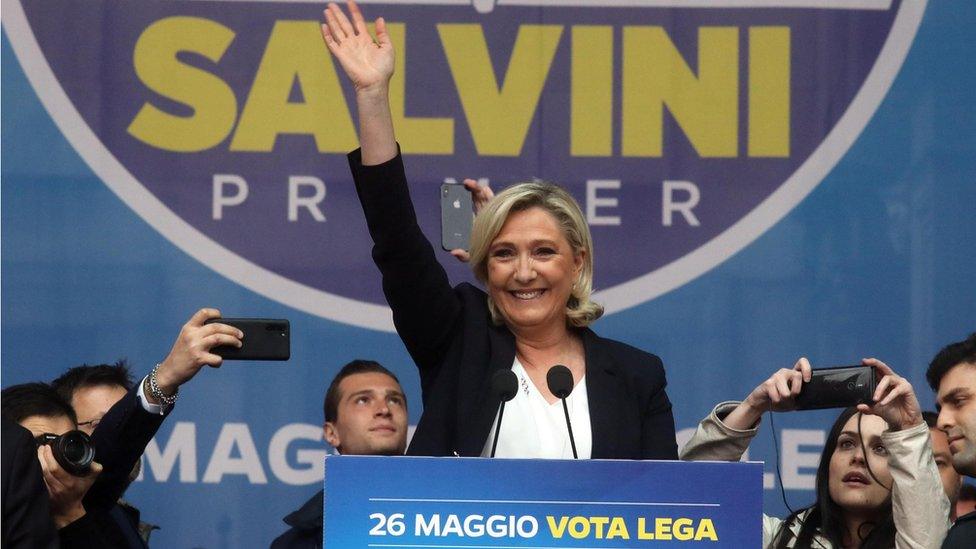
Marine Le Pen's embrace of Matteo Salvini's European alliance has not come naturally
And the growing strength of populists across Europe has led her National Rally (Rassemblement National in French) party to change its policy on EU membership. There's no more talk of "Frexit", or even a referendum on the subject; the party now talks of changing Europe "from within".
There's no doubt Europe's grand, old, populist party lends weight to Mr Salvini's new alliance, but both the politics and the diplomacy of its role are tricky.
"Lega is the Italian Rassemblement National," one senior RN adviser told a French newspaper. "Salvini created his party on our model. Even as a young man, he was asking Marine for selfies."
"We have no ego contest," Marine Le Pen said recently. But there's no doubt who is now leading Europe's nationalist parties - and it's not clear how well her party fits in.
The RN is not popular among Europe's other populists. Its warmth towards Russia, its historic image of anti-Semitism, and alleged fraud in its handling of European parliament funds have all contributed to tensions.
Hungarian PM Viktor Orban recently said he wanted nothing to do with Ms Le Pen.
It shows the challenge of uniting Europe's populist parties, all of whom pride themselves on putting national interests first.
And even if they get the seats they're hoping for, the new group won't amount to more than a quarter of the EU chamber; what Le Monde newspaper this week described as a "blocking minority that will let them carry on undermining things".

Will 'Trump's Twin' sign up?
By Nick Thorpe, BBC News, Budapest
As the poster boy of the far right in Europe, any new nationalist alliance would look pale without Viktor Orban.
Hungary's leader has invited both Matteo Salvini and Heinz-Christian Strache to Budapest in recent weeks, but he has been reticent about joining a new "nationalist bloc" after the EU elections.
His ruling Fidesz party still belongs to the EU's biggest political grouping - the centre-right European People's Party (EPP) - even though the EPP suspended its membership because of its right-wing policies.
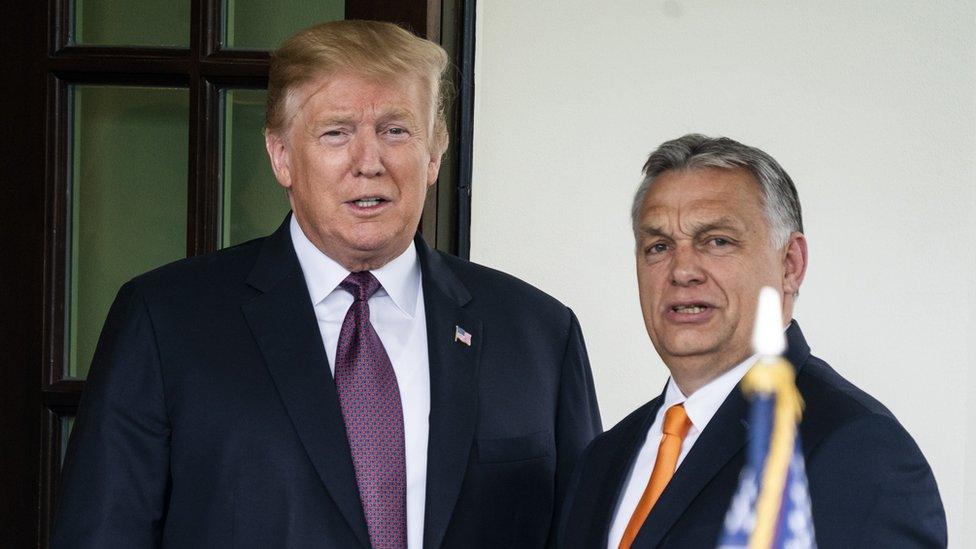
Mr Orban met President Trump on Monday - his first visit to the White House
His hope until now was that he could drag the EPP to the right, then weld it into a tight alliance with a new, Salvini-led grouping, without quite merging with them. But his relationship with the centre right is getting no better, and he identifies with the nationalist right so much more.
A long-awaited recent audience with President Donald Trump in the White House has put further wind in Mr Orban's sails.
His slogan in this election is: Support Viktor Orban's Programme, Let's Stop Immigration.
It is a populist, popular, but peculiar message in a country where there are very few immigrants, in an EU in which more than 600,000 Hungarians are regarded as immigrants themselves.

